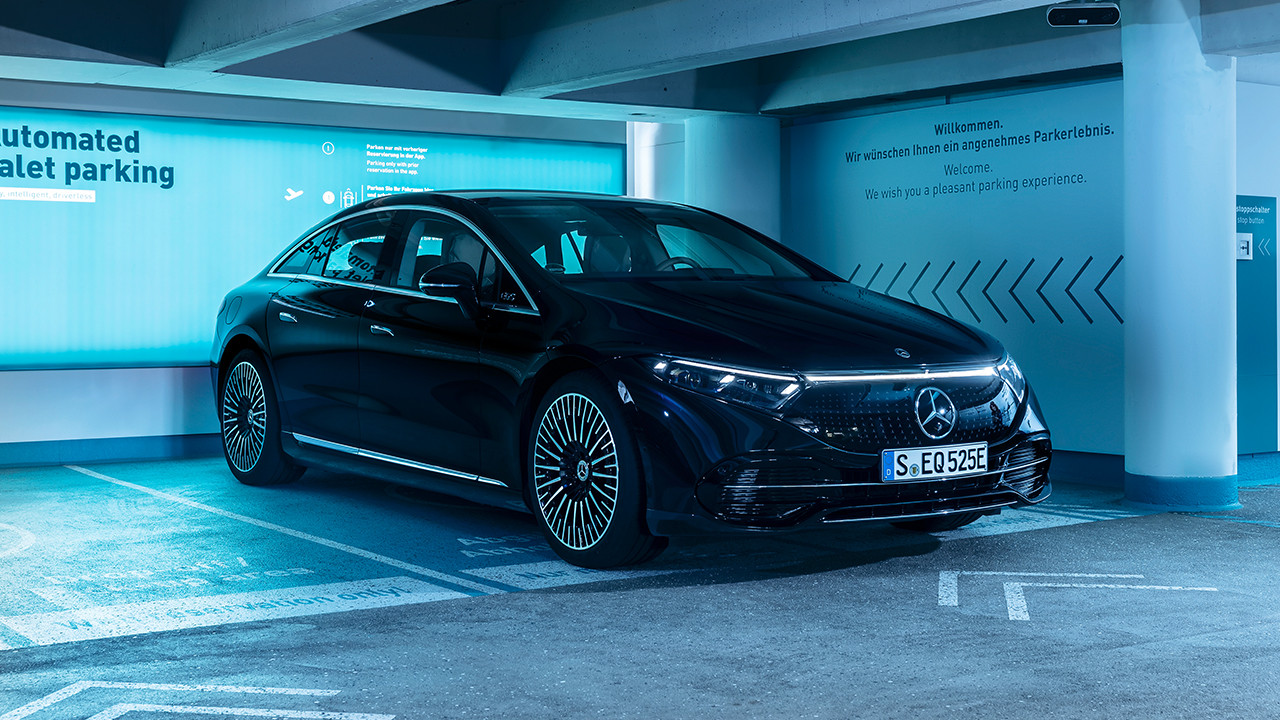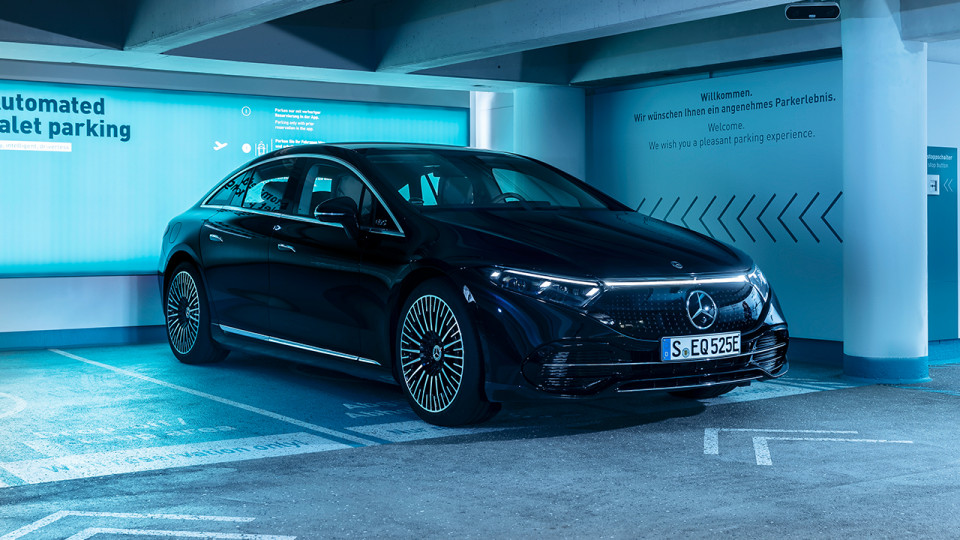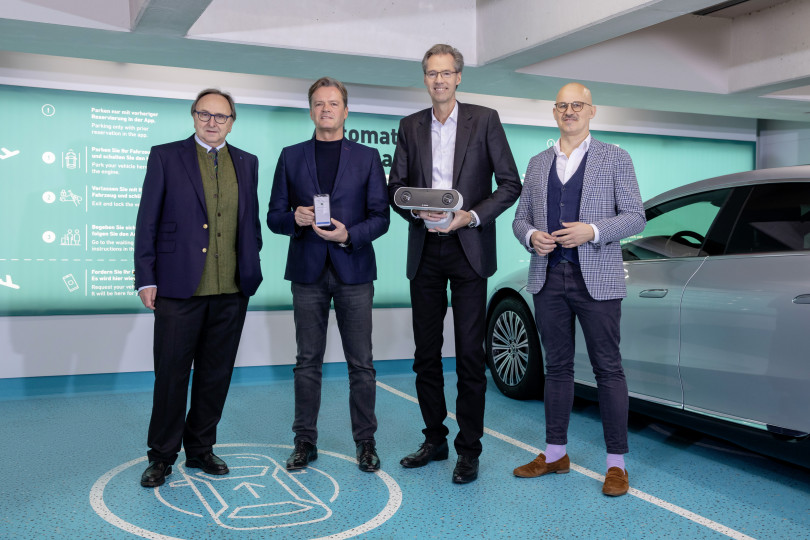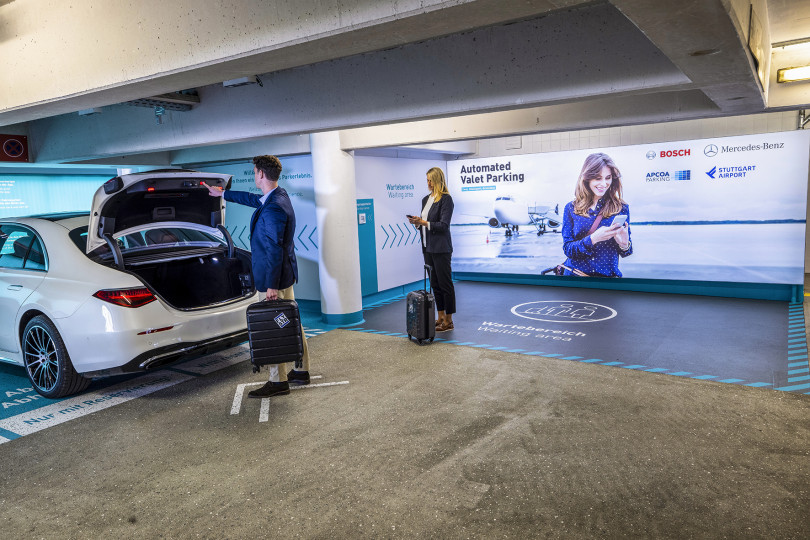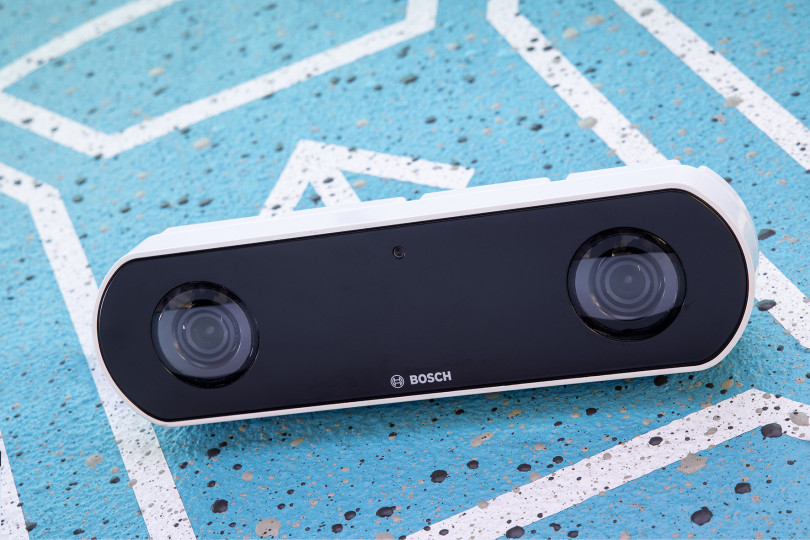Stuttgart, Germany – Bosch and Mercedes-Benz have reached an important milestone on the way to automated driving: Germany’s Federal Motor Transport Authority (KBA) has approved their highly automated parking system for use in the P6 parking garage run by APCOA at Stuttgart Airport. This makes it the world’s first highly automated driverless parking function to SAE Level 4¹ to be officially approved for commercial use. The technological advancement of automated driving plays a key role in the mobility of the future. With the vehicle and infrastructure taking over driving and maneuvering, drivers will be able to turn their attention to other things, instead of time spent looking for a parking space and maneuvering in tight parking garages.
“The world’s first approval for customer use of our highly automated and driverless parking function, developed together with our technology partner Bosch, shows that innovation leadership and ‘Made in Germany’ go hand in hand,” says Markus Schäfer, member of the board of management of Mercedes-Benz Group AG, chief technology officer, responsible for development and procurement. “Following the market launch of our DRIVE PILOT Level 3 system, we will soon be offering a Level 4 system for parking with our INTELLIGENT PARK PILOT – all of that this year. We really are showing our customers how technology can make life easier and give back precious time.”
“Driverless parking is a key aspect of automated mobility. The highly automated parking system we developed together with our partner Mercedes-Benz shows just how far we’ve already progressed along this development path. It will be with driverless parking that everyday automated driving will start,” says Dr. Markus Heyn, member of the Bosch board of management and chairman of the Mobility Solutions business sector. “From the outset, Bosch has taken the approach of making the infrastructure in parking garages intelligent. Accordingly, we have set standards in this area. In the future, our aim is to equip more and more parking garages with the necessary infrastructure technology – we plan to do several hundred of them worldwide in the next few years.”
“We are extremely pleased to have successfully developed a connected system for driverless and contactless parking together with our partners from Bosch, Mercedes-Benz, and Stuttgart Airport. Our digital platform, APCOA FLOW, can be used to book spaces, for contactless access to the parking garage, and for automatic invoicing of the stay in the garage,” says Frank van der Sant, a member of the board of management and chief commercial officer of APCOA PARKING Group. “For our customers, this means a huge gain in convenience: planning certainty, hardly any wasted time, short distances to walk, and a contactless and cashless parking process.”
“We are proud that STR has been chosen as the airport for this global premiere,” says Walter Schoefer, management spokesperson for Flughafen Stuttgart GmbH, which runs Stuttgart Airport. “The project shows how innovative our region is. Automated Valet Parking really enhances our flight passengers’ comfort and convenience and saves them time, especially when they’re in a hurry and just want to drop their car off quickly at the airport.”
The technology behind driverless parking
Drive in to the parking garage, get out, and send the vehicle to a parking space just by tapping in a smartphone app – the Automated Valet Parking service has no need for a driver. Once the driver has left the parking garage – to spend the time just saved on doing something else – the vehicle drives itself to its assigned space and parks. Later, the vehicle returns to the pick-up point in exactly the same way. This process relies on the interplay between the intelligent infrastructure supplied by Bosch and installed in the parking garage and Mercedes-Benz automotive technology. Bosch sensors in the parking garage monitor the driving corridor and its surroundings and provide the information needed to guide the vehicle. The technology in the vehicle converts the information it receives from the infrastructure into driving maneuvers. This way, vehicles can even drive themselves up and down ramps to move between stories in the parking garage. If the infrastructure sensors detect an obstacle, the vehicle brakes and safely comes to a complete stop. Only once the route is clear does it continue on its way.
It was in 2019 that Bosch and Mercedes-Benz obtained the world’s first special permit to operate Automated Valet Parking using development vehicles without human oversight in everyday operations of the parking garage of the Mercedes-Benz Museum in Stuttgart. The approval that has now been issued goes beyond this, allowing commercial operation with privately owned vehicles in the P6 parking garage at Stuttgart Airport. The basis for the approval is a law that came into force in Germany in July 2021, which permits driverless driving in accordance with SAE Level 41 for motor vehicles (BMDV – Germany will be the world leader in autonomous driving). Application of this law to the parking system was implemented in close coordination with the German Federal Ministry for Digital and Transport (BMDV) and the KBA. The AFGBV (autonomous driving directive), passed by the upper chamber of the German parliament on May 20, 2022, clearly specifies the criteria of the German road traffic act that Level 4 vehicles must satisfy.
The companies plan to gradually roll out the driverless parking service in the APCOA P6 parking garage at Stuttgart Airport. From the day it is released for operation, the first customers with S-Class and EQS models built since July 2022 whose vehicle variants feature the INTELLIGENT PARK PILOT service as part of Mercedes me connect, and who have activated this service, will be able to use the function at the P6 parking garage. Once drivers have used their Mercedes me app to book a parking space in advance, they can leave their vehicle in a predetermined drop-off area. After all the passengers have exited the vehicle, the app starts the parking maneuver. The parking system checks whether the route to the booked parking space is clear, and that all the other technical requirements have been satisfied. If this is the case, drivers receive a notification in the app confirming that the intelligent infrastructure has taken control of the vehicle. They can then leave the parking garage. The vehicle starts automatically and finds its own way to its parking space. When the driver wishes to retrieve their car from the parking garage, they can summon it via smartphone command. Their vehicle then makes its own way to a predetermined pick-up area.
1SAE J3016 defines six levels of automation for road vehicle driving operations (Level 0 to Level 5). Level 4 states: The vehicle can autonomously handle all traffic situations under certain conditions (e. g. in a parking garage). No driver is required.
2The INTELLIGENT PARK PILOT service from Mercedes me connect will initially be available in Germany for the Mercedes-Benz S-Class Saloon, Saloon Long and Mercedes EQS, starting with those built 07.2022 and later. This excludes Mercedes-Maybach and AMG models. The Mercedes-Benz S-Class Saloon and Saloon Long built as of 12.2020, excluding Mercedes-Maybach and AMG models, will follow shortly thereafter. Mercedes EQS models, excluding AMG, built as of 04.2021 will also follow shortly. As soon as INTELLIGENT PARK PILOT is available for a particular vehicle, the service will appear in the services menu of the Mercedes me app, ready for activation. In order to use the Mercedes me connect services, users require a personal Mercedes me ID and must agree to the conditions of use for Mercedes me connect services. Furthermore, the vehicle in question must be registered with the user account. Upon expiration of the initial period, users can extend services free-of-charge as long as those services remain available for that particular vehicle. First activation of services is possible within 1 year of initial vehicle registration or use by the customer, whichever is first.
Zita Hella Varga
Phone: +36 70 667-6374
Mobility Solutions is the largest Bosch Group business sector. It generated sales of 45.3 billion euros in 2021, and thus contributed 58 percent of total sales from operations. This makes the Bosch Group one of the leading automotive suppliers. The Mobility Solutions business sector pursues a vision of mobility that is safe, sustainable, and exciting, and combines the group’s expertise in the domains of personalization, automation, electrification, and connectivity. For its customers, the outcome is integrated mobility solutions. The business sector’s main areas of activity are injection technology and powertrain peripherals for internal-combustion engines, diverse solutions for powertrain electrification, vehicle safety systems, driver-assistance and automated functions, technology for user-friendly infotainment as well as vehicle-to-vehicle and vehicle-to-infrastructure communication, repair-shop concepts, and technology and services for the automotive aftermarket. Bosch is synonymous with important automotive innovations, such as electronic engine management, the ESP anti-skid system, and common-rail diesel technology.
Bosch has been present in Hungary since 1898 with its products. After its re-establishment as a regional trading company in 1991, Bosch has grown into one of Hungary’s largest foreign industrial employers with currently eight subsidiaries. In fiscal 2021 it had total net sales of 1,711 billion forints and consolidated sales to third parties on the Hungarian market of 273 billion forints. The Bosch Group in Hungary employs more than 17,000 associates (as of December 31, 2021). In addition to its manufacturing, commercial and development business, Bosch has a network of sales and service operations that covers the entire country.
The Bosch Group is a leading global supplier of technology and services. It employs roughly 402,600 associates worldwide (as of December 31, 2021). The company generated sales of 78.7 billion euros in 2021. Its operations are divided into four business sectors: Mobility Solutions, Industrial Technology, Consumer Goods, and Energy and Building Technology. As a leading IoT provider, Bosch offers innovative solutions for smart homes, Industry 4.0, and connected mobility. Bosch is pursuing a vision of mobility that is sustainable, safe, and exciting. It uses its expertise in sensor technology, software, and services, as well as its own IoT cloud, to offer its customers connected, cross-domain solutions from a single source. The Bosch Group’s strategic objective is to facilitate connected living with products and solutions that either contain artificial intelligence (AI) or have been developed or manufactured with its help. Bosch improves quality of life worldwide with products and services that are innovative and spark enthusiasm. In short, Bosch creates technology that is “Invented for life.” The Bosch Group comprises Robert Bosch GmbH and its roughly 440 subsidiary and regional companies in some 60 countries. Including sales and service partners, Bosch’s global manufacturing, engineering, and sales network covers nearly every country in the world. With its more than 400 locations worldwide, the Bosch Group has been carbon neutral since the first quarter of 2020. The basis for the company’s future growth is its innovative strength. At 128 locations across the globe, Bosch employs some 76,100 associates in research and development, of which more than 38,000 are software engineers.
Additional information is available online at www.bosch.hu, iot.boschblog.hu, www.bosch.com, www.iot.bosch.com, www.bosch-press.com, http://www.twitter.com/BoschPress.

